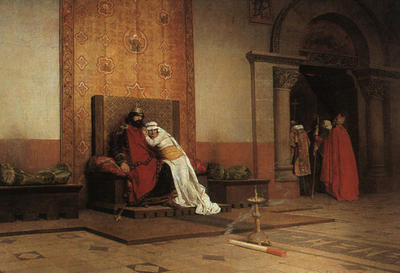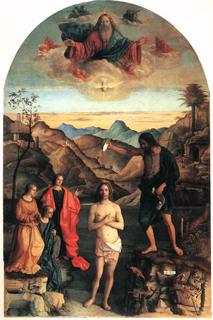I just received a challenging email:
Dear John.Here's my reply...
Allow me to express my thoughts about the Catholic Church's claim to be the one founded by Jesus Christ. I would say, it is a big lie. If it is the one founded by Jesus Christ, then why so many of them (priests, bishops, cardinals) from the middle ages to now did not live their lives according to Jesus Christ's teachings or of the lives of the Apostles. I don't have to mention the details because its very obvious. Just look around. I don't need to cite scriptures to to prove what l am saying because its very obvious. Thank you. God bless.
C-
Hi, C,
Thank You for writing to me with Your question. It’s a very good question and I’ll try to provide some answer.
It seems to me that essentially You are asking why there are sinners in the Church. You are implying that if Jesus founded a church, its members would be holy; they would live according to Jesus Christ’s teachings; they would not sin. And if we find a church whose history has many examples among its members and leaders who sinned badly, certainly that is evidence that this church was not founded by Jesus. Right?
Well, no, actually. Look at the first apostles. James, John –and their mother- wanted special places of honor above the others in Jesus’ kingdom (Matthew 20:21). Peter denied Jesus three times. Judas stole money from Jesus and the others, and later betrayed Jesus. At Jesus’ arrest all the apostles (except John) ran away. Peter acted hypocritically toward the Jews and gentiles and received the rebuke of Paul. You can be sure there were many other sad failings among the apostles and other disciples that were not recorded in the Gospels. And the other New Testament writings are full of evidence that the early Christians were sinners who struggled with divisions, factions, controversies, and scandals. Not just among the apostles and priests, but among the lay members as well. Are these facts proof that Jesus did not found a Church, or that His Church was ruined by sin? Did Jesus' plan to build a Church ultimately fail?
No. To think so is to misunderstand the Church Jesus founded. The Church has the Son of God as its head and cornerstone, but very human apostles as its foundation. Its walls are built of living stones which are very much redeemed sinners still struggling to imitate Christ despite many failings. It has the Holy Spirit to guide its members on their path through life, but has human members who have not lost their ability to sin. Christ is the vine, and we are the branches, but we branches have the ability to choose to do God’s will, or to turn away and prefer our own will.
You mention the sinfulness of bishops and cardinals. But what about Your own sinfulness, and mine? Has Your life been blameless? Mine has not.
C, if You believe that “true” Christians don’t sin, then You don’t know Your Bible any better than You know human nature. If You believe there is a church –perhaps Your own- that has as its leaders and members people who never sin, then I will use Your own words: “it is a big lie”. The possibility of sin will not be completely erased from the lives of the saved until all the saved have been gathered into Heaven.
Until then we remain at war. The Holy Spirit equips us to do battle against temptations to turn away from the will of God. With God’s help it is very possible to resist sin, and to grow stronger so that we can live more and more holy lives. But in this life we always have the possibility of rejecting God, and Christians sometimes fall into sin. When we see a fellow believer stumble and fall into sin, it is a terrible thing… just as when it happens in our own lives. But it does not mean that we are not believers, or that we are not members of Jesus’ Church.
C, the Church is like a hospital, a hospital for sinners. The hospital does not kick out patients (or the doctors) because they are sick, or because they fall ill more than once. The fact that they are sick does not prove that the hospital is not a hospital.
So, C my friend, I say to You that You are using the wrong measuring stick to identify the Church. You won’t find the Church Jesus founded by searching for a church with no sinners. You will find it by asking God to help You find it, and then by studying what the Bible teaches about the Church. There are several simple things the Bible clearly teaches about the Church:
1) It is One. Jesus found a Church, and He didn’t found two, three, or ten thousand of them. He founded one.
2) It is holy. It contains everything that we need to grow in holiness: holy teachings; the holy sacraments; holy fellowship; the example of countless thousands of saints –a “great cloud of witnesses”- whose lives reflect the light of Christ and inspire us to imitate Him. It not only helps people become holy, it in fact does produce many people who achieve great holiness.
3) It is “catholic”, meaning universal. It is a church for the whole world, for all peoples and times. It is a reflection and foretaste of Heaven, where all Christ’s followers are united in one faith, one Lord, one baptism.
4) It is apostolic. It was founded upon apostles personally selected by Jesus, and who had the authority to pick other men to share that role with them and after them. For the past twenty centuries that apostolic authority has continued among those who have received it from the apostles and their successors. Nothing in the Bible indicates that this apostolic foundation was ever to be abandoned.
The Catholic Church has the four key characteristics. Does Yours?
Finally, I think it's dangerous to pass judgement on the hearts of other persons, especially Christians who lived many centuries ago. People we might be tempted to think were really big sinners might have lived lives more pleasing to God than our own. Humility and a healthy respect for God's justice should make us guard against passing negative judgement on others.
C, I would love to hear Your thoughts about these important things!
Thank You again for writing to me.
God bless You,
John Robin.













